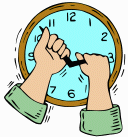|
An Essay by Jeffry Dwight One day, the teacher didn't ring the 11:00 bell. I waited until 11:05, feeling more and more uneasy with each passing minute, watching the teacher interact with the other students and ignore the bell. Finally, at 11:06, I couldn't take it any longer. I got up, went to the teacher's desk, and rang the bell. The rest of the class dutifully put away their books and started getting out their finger-paints.
The teacher was furious. She thought I was trying to make trouble or take charge of the class. She called a parent-teacher conference. My oldest brother got through twelve years of school without a parent-teacher conference -- I had one within my first month at school. At first she didn't want to believe a little four-year-old could read the clock; I don't know why that surprised her, but it did. When she finally understood that my intention was just to keep the class on schedule, she explained that she was in charge of the clock, and that the clock was not in charge of her. I didn't believe her. Even at age four, I knew that no one was in charge of the clock. It did what it wanted to do, at its own pace, whether you were paying attention to it or not. You could hold your breath, or scream, or run in circles shouting, and you couldn't make the clock go any faster or slower.
|
||||||
|
A few years later, having learned not to touch other people's bells, my brother and I ate lunches with a family friend for a month or so while our mother recuperated from an illness. The friend, a nice-enough lady, lived only a few blocks down the street from the school, and a sturdy third-grader could make the trip in about five minutes. We had to be back at school precisely at 12:50, giving us 10 minutes to hang up our coats and whatnot before afternoon classes started at 1:00. It was very important that we arrive at the school by 12:50, for the teachers had everyone line up in the yard outside and be counted before allowing us to funnel back into the building. In order to get back to school at 12:50, I had to leave the nice lady's house no later than 12:45. I discovered one day that her large blue-and-white chicken clock on the kitchen wall was not correct. I left when the chicken's beak pointed half-way up the left-hand side of the clock face. But though I walked at my usual pace, I arrived at school 10 minutes late. Clearly the fault was the chicken's, but that didn't stop the teachers with their clipboards from making nasty little marks beside my name.
The following day, I informed the nice lady (very politely) that her chicken was broken, and asked her to fix it. She waved her hand dismissively and said she'd just set it that morning. How did she set it, I wanted to know. By when As the World Turns started on television, she told me. I was horrified. Television shows don't start precisely on the half-hour. Sometimes they squeeze in an extra commercial. Sometimes they have a teaser before show starts. Sometimes there's a baseball game, or an important news story, and shows can therefore start at almost any time. I tried to explain this. She listened in that abstracted way adults have when they don't really care, and told me the clock was "close enough" to the right time. I suppose I was more vehement and persistent than necessary, for, after bringing it up several times each lunch hour for several days in a row, the nice lady called my sick mother and told her that, sick or not, she would have to take care of my lunches henceforth. Close enough? What was she thinking? Anything other than right was wrong! It seemed pretty clear to me. |
||||||
|
It seemed clear to my grandfather, too. He was well-known for always arriving at appointments on time. He was very insistent on this point. I'd caught him waiting on the porch, studying his pocket-watch, waiting for the exact moment to knock. He had a policy of always arriving anywhere a full minute early, so he could have small last-minute problems and still be on time.
While I otherwise didn't have much in common with my grandfather, I agreed with him about this. The trouble was he infuriated the rest of the family, for they were somewhat lackadaisical about time, and he was constantly haranguing them about being late. Personally, I felt that knowing the time precisely was far more important than being on time precisely, so I thought it would help if -- just once -- my grandfather would be late for an appointment. He lived right down the street from us, so I snuck into his bedroom one day, found his pocket-watch on the bedstand, and set the time back 10 minutes. He was due at our house for dinner that night, and if he came 10 minutes late, he would lose the authority to harass my family about being late. Much to my surprise, he arrived on our porch one minute before the appointed hour, and stood quietly studying his pocket-watch until the hands lined up, then knocked precisely at 6:00. Years later, when I confessed my crime and asked how he'd managed to be on time, he told me that he always checked his pocket-watch before leaving the house, on the off-chance that he'd forgotten to wind it. I suspect he wore suspenders and a belt, too. But I took the lesson to heart. From then on, even though I was often late, I always knew exactly how late I was. |
||||||
|
My fascination with time has continued through my adulthood. When I started driving, I noticed that the roadside digital clock displays popular with banks of the time were often wrong by several minutes. For a while, I used to stop and try to talk the bank managers into correcting the time. I've been known to tilt at windmills, too, with pretty much the same level of success. I started working with electronics in my late teens and discovered the wondrous regularity of crystal oscillators -- and their limitations. When I started working with personal computers in the early 1980's, it was immediately clear to me that something had to be done about the computer's time-keeping abilities. In those early days, many computers either had no clock at all, or had a supposedly-real-time clock on an add-on card. Even with the RTC, the computer did a pitiful job at tracking elapsed time.
Things got better as hardware got better, and almost every kind of computer now includes a clock that keeps running -- more or less -- when the power is off. But when I started working with networks in the late 1980's and early 1990's, the quirkiness of computer clocks stopped being merely annoying and became a real problem. Files were edited before they were created. Backups skipped files that clearly existed but had tomorrow's time stamp. Emails from the years 1980 and 2010 arrived and were misfiled immediately. One didn't dare sort by date without checking the results by hand afterward. Scheduled events happened when they wanted to, not at the time I specified. Something had to be done. I wrote the first version of Domain Time in 1994 for my own use. The UNIX platform had a number of time synchronization products available, but very little was ported to DOS/Windows/NT at that time, and the programs tended to be quirkier than the problems they addressed. I wanted something simple, reliable, and easy to configure. Something that was better than "close enough." When we started selling software online in 1995, we offered Domain Time as part of Greyware's catalog. I was surprised and pleased to find it selling well -- better, in fact, than any other program we offered. Perhaps, I decided, I wasn't the only one who felt that this was an important area of concern. Over the years since then, we have continually upgraded and improved Domain Time, incorporating both our own ideas and customer suggestions. If you haven't tried it yet, you should. It's about time. It always has been. |
||||||










